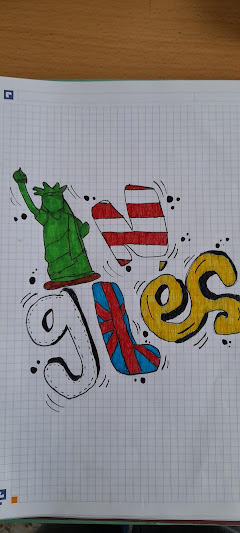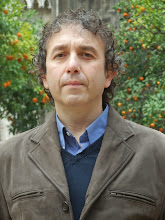miércoles, 13 de mayo de 2009
miércoles, 22 de abril de 2009
PAST SIMPLE CONTINUOUS
PAST SIMPLE CONTINUOUS
SUBJECT + WAS / WERE + VERB-ing + (Complements)
STATEMENT
You were listening to the radio
He was coming from school by car
You were being an animal
NEGATION
You were not listening to the radio
He was not coming from school by car
You were not being an animal
INTERROGATION
Were you listening to the radio?
Was he coming from school by car?
Were you being an animal?
TIME EXPRESSIONS:
• YESTERDAY / THE DAY BEFORE YESTERDAY
• AT (Hours) / ON (Days of the Week) / IN (Months, Years and Centuries)
• LAST (day, year, time, ...) / THIS / THAT (day, year, time, ...)
• WHEN versus AS / WHILE: WHEN + Past Simple
(Action interrupting the continuous)
WHILE / AS + Past Simple Continuous (Action continuous)
WHEN she heard the noise, she was making a cup of tea
WHILE / AS she was making a cup of tea, she heard the noise
USES:
• Continuous activity in the past: They were working in London last year
• Continuous activity in the past interrupted by a past action: I was watching TV when the light went off
• Simultaneous actions in the past: Mary was reading a book WHILE / AS Peter was watching a film
• With ALWAYS to show annoyance (irritation) or surprise: She was always laughing
STATIVE VERBS:
• They cannot be used in the progressive form
• They are used to express feelings, likes and dislikes, possession and mental activities:
- LOVE, HATE, WANT
- LIKE, DISLIKE
- OWN, HAVE GOT
- THINK, REMEMBER, KNOW, UNDERSTAND, BELIEVE
PRESENT PERFECT SIMPLE
PRESENT PERFECT SIMPLE
SUBJECT + HAVE / HAS + VERB-pp + (Complements)
STATEMENT
I have eaten some apples
She has written a good novel
They have walked home early
NEGATION
I have not eaten some apples
She has not written a good novel
They have not walked home early
INTERROGATION
Have I eaten some apples?
Has she written a good novel?
Have they walked home early?
TIME EXPRESSIONS:
• FOR / DURING / SINCE- FOR: A period of time: He has worked as a miner for six years
- DURING: A period of time defined by itself: He has worked as a miner during the autumn
- SINCE: A period of time extending into the present: He has worked as a miner since he left school
• EVER / NEVER- EVER: To express at any time in the past until now:
Interrogative (ALGUNA VEZ): Have you ever been to London?
Negative (NUNCA): I have not ever drink gin
- NEVER: To express at no time (the opposite of ‘ever’):
Affirmative (NUNCA): I have never been to London
• ALREADY / YET- ALREADY:
Affirmative (YA): They have already finished
- YET:
Interrogative (YA): Have you finished yet?
Negative (AÚN / TODAVÍA)): He has not finished his meal yet
• JUST
To express a recently completed action:
- JUST (ACABAR DE): The children have just come from school
USES:
• A past that is in some way connected to the present: I have walked for two hours
• Actions happened in an indefinite past time, where those actions are more important than the time when they happened: The workers have finished the house
• Actions that began in the past and are not yet finished: I have lived in this house all my life
• Actions in the past that may be repeated in the future: He has built many houses
PRESENT SIMPLE PERFECT versus PAST SIMPLE
PRESENT SIMPLE PERFECT:
- Past action with no mention of time: I have been to London many times
- Past action with visible effect in the present: Volunteers have cleaned the beach
PAST SIMPLE:
- Past action with mention of time: I went to London last summer
- Past action with no visible effect in the present: I went to the beach last summer
United Kingdom Flag and Anthem
This flag is called 'the Union Jack' and it is made from the national flags of the four countries comprised within the United Kingdom (Scotland, Wales, England and Northern Ireland).
miércoles, 15 de abril de 2009
United Kingdom Map
miércoles, 18 de marzo de 2009
miércoles, 11 de marzo de 2009
PRESENT SIMPLE

PRESENT SIMPLE
SUBJECT + VERB (‘s’ in third singular person) + (Complements)
STATEMENT
I walk every day
She comes from school on foot
They are good friends
NEGATION
I do not walk every day
She does not come from school on foot
They are not good friends
INTERROGATION
Do I walk every day?
Does she come from school on foot?
Are they good friends?
USES:
• Permanent states: He lives in London
• Repeated or habitual actions: She wears smart clothes
• General truth: Man is a human being
• To give instructions: Then, you dial the number
• Historic Present for past events: Columbus discovers America in 1492
• Arranged future: The plane arrives tomorrow evening
• 1st Conditional Clauses (Probale / Likely): If you call him, he will come
TIME EXPRESSIONS:
• EVERY afternoon / day / month / year / century
• USUALLY
• AT (Hours) / ON (Days of the Week) / IN (Months, Years and Centuries)
• ONCE / TWICE / THREE TIMES a DAY / MONTH / YEAR
• ALL THE TIME
SPELLING RULES:
• Final ‘s’, ‘sh’, ‘ch’, ‘x’: + ES: GUESS – GUESSES / WASH – WASHES / WATCH – WATCHES / MIX - MIXES
• Final ‘o’: + ES: GO – GOES / DO - DOES
• Final C + ‘y’: + I + ES: CARRY – CARRIES / STUDY - STUDI
Suscribirse a:
Comentarios (Atom)



